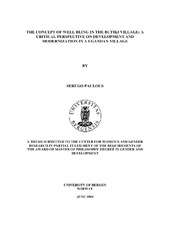The Concept of Well Being in the Butiki Village: A Critical Perspective on Development and Modernization in a Ugandan Village
Master thesis
Permanent lenke
https://hdl.handle.net/1956/1485Utgivelsesdato
2004Metadata
Vis full innførselSamlinger
Sammendrag
Improving the conditions of the poor is an essential part of the dominant development discourse. This discourse does not often include the actors’ point of view in the design process of development projects. Although the sequence of the chapters in this study does not pretend to deal exhaustively with the problems of well being, it attempts to indicate the path to be followed to guarantee well being in areas where development projects are to be carried in a meaningful way. When development agents claim to work for the improvement of the conditions of the poor, we must ask, how should projects improve conditions of the poor? Keeping this in mind, the study proposes the need to pay attention to the conception of well being of the actors. It is because of the above that the study employed methodological and thematic perspectives that reveal and are relevant to investigating the concept of well being in the Butiki village. The study was conducted in the Butiki village in Jinja district found in the Busoga region of Uganda. The study set out to investigate how the people of the Butiki village understand and interpret the meaning well being. In order to write a concrete case study, I contacted the Organization for Development and Co-operation as the organization has a number of development projects in the Butiki village. Since the study has as its major objective to establish the actor’s point of view the main topics center on three themes, namely: conceptualization of well being, the role of ODECO in the village, then gender relations and how they affect well being. In this study, I contribute to the development discussion by use of both descriptive and normative approaches. Chapters one to five are mostly descriptive, providing the basis for the normative assessment in chapter six and chapter seven. The normative assessment is an attempt to suggest the idea that development projects ought to consider particular conceptions of well being relative to good life of the actors.
Utgiver
The University of BergenOpphavsrett
Copyright the author. All rights reservedThe author
